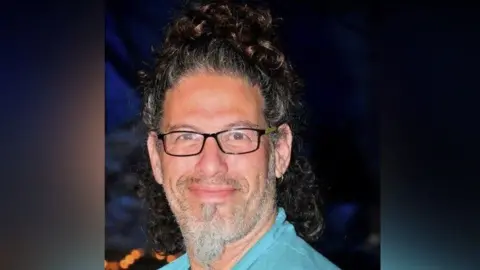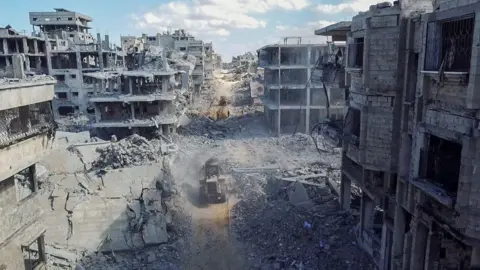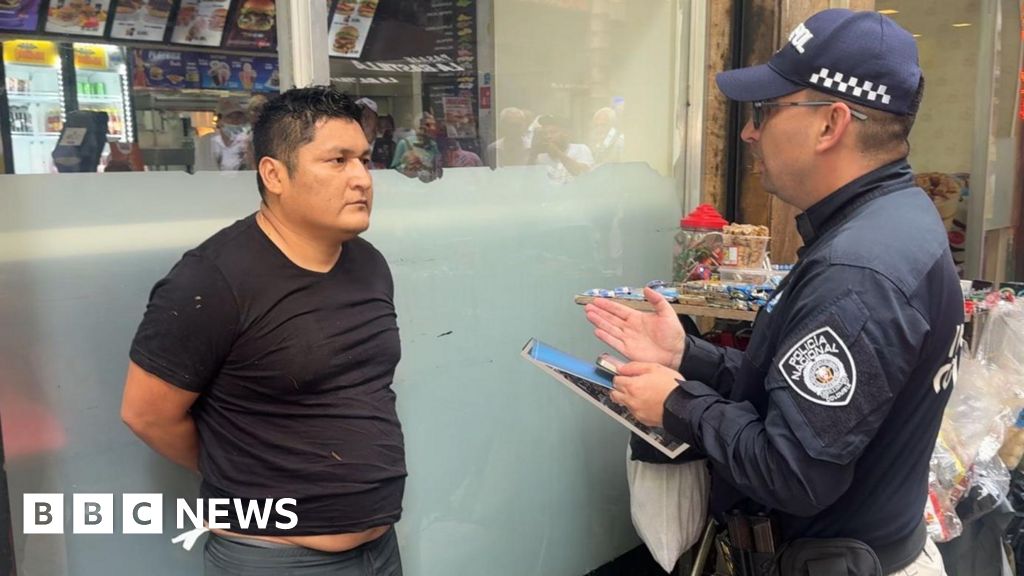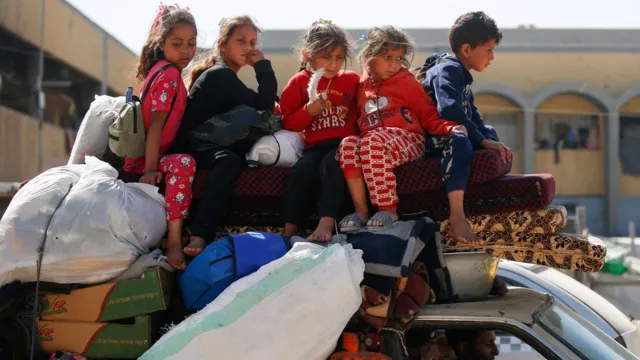Ian Aikman and
Rachel Hagan
 Hostages and Missing Families Forum
Hostages and Missing Families ForumThe daughter of one of the latest dead hostages to be returned to Israel from Gaza has said her father is “finally home”.
Ronen Engel’s daughter, Mika, wrote on Instagram: “It’s not what we hoped, it’s not what we wished for him, but it’s finally here.”
The remains of Mr Engel, 54, a photographer, and 30-year-old Thai farm worker Sonthaya Akrasri were the latest to be returned by Hamas on Saturday.
Both were killed during the 7 October 2023 attack and their bodies were taken to Gaza, the IDF said. They are the 11th and 12th of 28 dead hostages to be returned under the ceasefire deal.
Mr Engel’s wife, Karina Engel-Bart, and their teenage daughters were also taken hostage but were released in November 2023 during a truce between Israel and Hamas. The following month, the IDF confirmed that Mr Engel had been killed in captivity.
Israel’s Hostages and Missing Families Forum said in a statement that Mr Engel was remembered by loved ones as a man with “hands of gold and the soul of an artist”.
He was a photographer and volunteer ambulance driver for Israel’s emergency service Magen David Adom.
The second dead hostage returned was identified by Israel on Sunday as Sonthaya Akrasri, a Thai agricultural worker who was killed on 7 October while living at Kibbutz Be’eri. Thailand’s foreign ministry announced his death in May 2024.
He was the father of a seven-year-old daughter and had planned to return to Thailand to open his own farm, the Hostages and Missing Families Forum said.
 Hostages and Missing Families Forum
Hostages and Missing Families ForumThe delay in the return of the dead hostages has caused outrage in Israel, as the terms of last week’s ceasefire deal stipulated the release from Gaza of all hostages – living and dead. Hamas has said it is struggling to locate the remaining bodies under the rubble in Gaza.
Israeli Prime Minister Benjamin Netanyahu’s office has ordered the Rafah border crossing between Gaza and Egypt to remain closed until further notice, and said its reopening would be considered based on the return of the final hostage remains and the implementation of the ceasefire agreement.
The Rafah crossing is vital for Palestinians who need medical assistance to leave, and for thousands of others to return.
The IDF has stressed that Hamas must “uphold the agreement and take the necessary steps to return all the hostages”.
But the US has downplayed suggestions that the delay amounts to a breach of the ceasefire deal, which President Donald Trump claimed as a major victory on a visit to Israel and Egypt last week.
The text of the deal has not been published, but a leaked version that was seen in Israeli media appeared to account for the possibility that not all of the bodies would be immediately accessible.
Hamas has blamed Israel for making the task difficult, as air strikes on Gaza have reduced many buildings to rubble, and Israel does not allow heavy machinery and diggers into the territory.
UN humanitarian chief Tom Fletcher told the BBC News Channel that the Gaza Strip “is now a wasteland”, with people picking through the rubble for bodies and trying to find their homes – many of which have been flattened.
As part of the US-brokered ceasefire deal, Hamas also returned all 20 living hostages to Israel.
 Reuters
ReutersAlso as part of the deal, Israel freed 250 Palestinian prisoners in Israeli jails and 1,718 detainees from Gaza.
The bodies of 15 Palestinians were handed over by Israel via the Red Cross to officials in Gaza on Saturday, the Hamas-run health ministry said, bringing the total number of bodies it has received to 135.
Separately on Saturday, 11 members of one Palestinian family were killed by an Israeli tank shell, according to the Hamas-run civil defence ministry, in what was the deadliest single incident involving Israeli soldiers in Gaza since the start of the ceasefire.
The Israeli military said soldiers had fired at a “suspicious vehicle” that had crossed the so-called yellow line demarcating the area still occupied by Israeli forces in Gaza.
There are no physical markers of this line, and it is unclear if the bus did cross it. The BBC has asked the IDF for the coordinates of the incident.
The Israeli military launched a campaign in Gaza in response to the 7 October 2023 attack, in which Hamas-led gunmen killed about 1,200 people in southern Israel and took 251 others hostage.
At least 68,000 people have been killed by Israeli attacks in Gaza since then, according to the Hamas-run health ministry, whose figures are seen by the UN as reliable.
In September, a UN commission of inquiry said Israel had committed genocide against Palestinians in Gaza. Israel categorically rejected the report as “distorted and false”.




